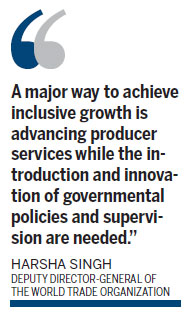


China's services, especially producer services, will play a very important role in economic growth and urbanization while experts called for the government to create a fair environment and reform monopolies in some sectors.
"China has made great progress in achieving inclusive growth in recent years in view of its improvement in per capita income and poverty reduction, which is mainly owing to the important effect of trade in services on boosting balanced, sustainable and inclusive growth," Harsha Singh, deputy director-general of the World Trade Organization, told a forum at the China International Fair for Trade in Services.
"A major way to achieve inclusive growth is advancing producer services while the introduction and innovation of governmental policies and supervision are needed."
Sun Zhenyu, head of the China Society for WTO Studies and former Chinese ambassador to the WTO, added that services, especially producer services including transport, modern logistics, finance, information and business, will play a key role in China's urbanization and economic growth.
"The government's responsibility is creating a level environment for competition between different enterprises, which is the basis for boosting services, especially producer services. In addition, only reforms can end monopolies, in some competitive industries in particular, and thus stimulate the development of services," Sun said.
He added that the training of personnel demanded in producer services will be a major task for education while modern measures, such as IT and the Internet of Things, should be introduced to promote services development.
Xia Jiechang, a researcher at the National Academy of Economic Strategy at the Chinese Academy of Social Sciences, said that China is a leading country in manufacturing but producer services were not well developed.
China's starting level for developing producer services was low. It served as the world's equipment manufacturer in the past decade while the country is now transiting from traditional services to producer services and reforms need to be deepened, Xia said.
Sun added that China should take trade in services as a new way to further integrate into the world economy and the government needs to introduce new moves in opening-up to boost the trade in services.
Meanwhile, different countries should liberalize and facilitate investment and trade in services, which will drive up the sluggish world economy.
Supachai Panitchpakdi, secretary-general of United Nations Conference on Trade and Development, said that developing services trade is challenged by insufficiency in the supply chain and management, as well as lagging negotiations on trade in services.
"The government should introduce more support in policies while services enterprises suffer from a structural shortage of manpower and the training of suitable workers is really urgent," said Yang Dong, deputy president of Dalian Software Park Co Ltd.
The software park, created in 1998, allows the world's large and medium-sized IT-related companies to set up shop for development.
Hong Xiaodong, deputy director of the department of WTO affairs at the Ministry of Commerce, said that "the government should, first of all, have sufficient awareness of producer services and its role in growing the economy".
"Favorable policies are also needed to boost producer services," Hong said.
"Governments should devote more efforts in innovating mechanisms and building up a fair environment rather than offering subsidies," Hong added.
What's more, the government should also promote design, research and development, management and sales to enhance the competitiveness of China's producer services while the potential is huge for advancing reforms to open up services sector, Hong said.
In 2012, the value added in the services sector accounted for 44.6 percent of GDP and employment in the services sector made up 36 percent, which remarkably falls behind developed economies and also trails some developing countries.
lijiabao@chinadaily.com.cn